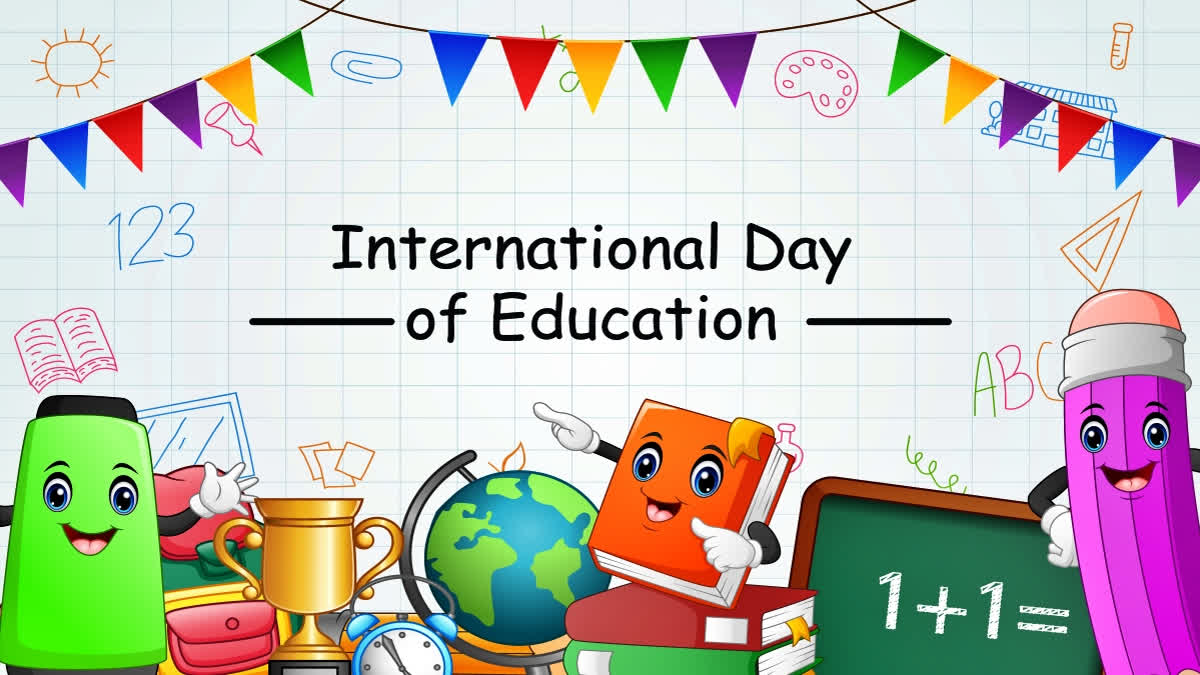Hyderabad: Education, recognised as a fundamental human right and a public good, holds the status of being a public responsibility. The United Nations General Assembly declared January 24 as the International Day of Education, commemorating the pivotal role education plays in creating an environment filled with peace and development.
Concerning figures- At present, around 250 million children and youth find themselves outside the realms of formal education, and a further 763 million adults grapple with illiteracy. This stark reality constitutes a blatant violation of their right to education, a circumstance deemed unacceptable. Urgent transformations are deemed necessary to address this global educational crisis.
History- The backdrop to the International Day of Education stems from the unanimous adoption of Resolution 73/25 by the United Nations General Assembly on December 3, 2018. The resolution, co-authored by Nigeria and supported by 58 other Member States, underlines the political commitment to initiatives creating inclusive, equitable, and high-quality education for all.
International recognition- The international community's recognition of education as a linchpin in building sustainable and resilient societies, contributing to the attainment of Sustainable Development Goals, has prompted a call for heightened international cooperation. Stakeholders, including Member States, UN organizations, civil society, NGOs, academic institutions, the private sector, and individuals, are urged to observe the International Day of Education.
Theme '2024'- The 2024 edition of the International Day of Education revolves around the theme "Learning for Lasting Peace." UNESCO directs its focus on countering hate speech, which has experienced a recent surge globally. Hate speech, identified as a driver of prejudice, discrimination, and violence, particularly exacerbated by social media and ongoing crises, poses a severe threat to global communities' safety and security.
Anti-Defamation League- The aftermath of the October 7, 2023, Hamas terrorist attack against Israeli civilians saw a significant spike in anti-Semitic incidents. The Anti-Defamation League reported a 337% increase in the USA, 320% in Germany, and a staggering 961% surge in Brazil compared to the previous year. The Netherlands experienced an 818% increase over the past three years. Additionally, the UK-based Institute for Strategic Dialogue (ISD) documented a 43-fold increase in anti-Muslim discourses on YouTube in the days surrounding the attack.
Indian context- In the context of India, UNICEF is dedicated to ensuring inclusive and equitable quality education for all children. While progress has been made in improving access and reducing out-of-school children, challenges persist. The literacy rate among Indian women surged to 77% in 2023, with the male literacy rate standing at 84.7%. However, over 12 million students were out of school in 2022-23, with boys outnumbering girls. The maximum number of out-of-school children at the elementary level (age 6 to 14 years) were in Uttar Pradesh (3,96,655), followed by Bihar (1,34,252), Gujarat (1,06,885), Assam (80,739), Haryana (22,841), and Tamil Nadu (20,352), among others, the data shows.
Annual Status of Education Report- The 2023 ASER report explores the educational status of 14-18-year-olds in India. The report reveals that 85.6% of the cohort are enrolled in school or college. However, a significant number of youth lack foundational literacy and numeracy skills. The report emphasizes the need to improve these skills in higher grades. Additionally, the report highlights the importance of critical thinking and problem-solving skills in education. It suggests a reorientation of teaching methods to enable students to apply academic concepts to real-life situations.
National Education Policy- NEP 2020 envisions a massive transformation in education through– “an education system rooted in Indian ethos that contributes directly to transforming India, that is Bharat, sustainably into an equitable and vibrant knowledge society, by providing high quality education to all, thereby making India a global knowledge superpower.” The NEP 2020 is founded on the five guiding pillars of Access, Equity, Quality, Affordability and Accountability. It will prepare our youth to meet the diverse national and global challenges of the present and the future.
Aligned with the global education development agenda reflected in SDG4 of the 2030 Agenda for Sustainable Development, India seeks to ensure inclusive and equitable quality education for all by 2030.



